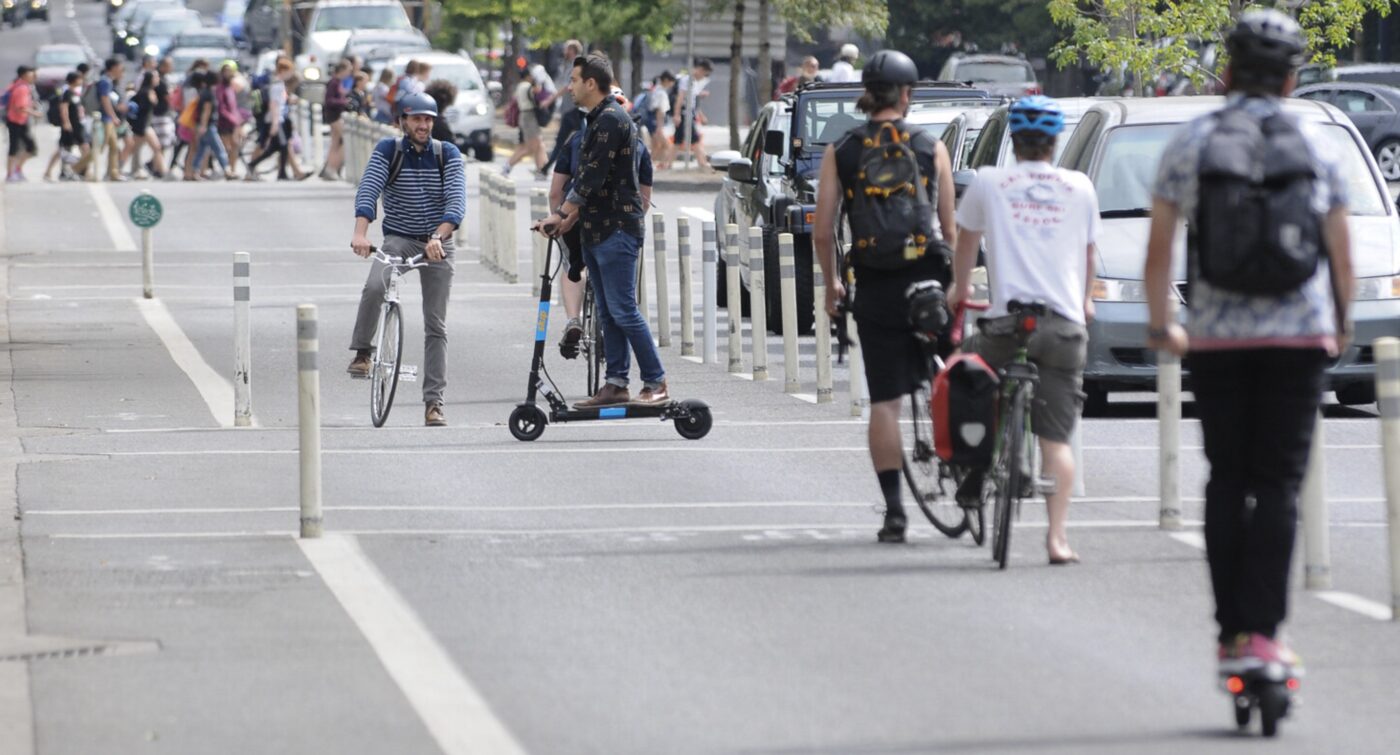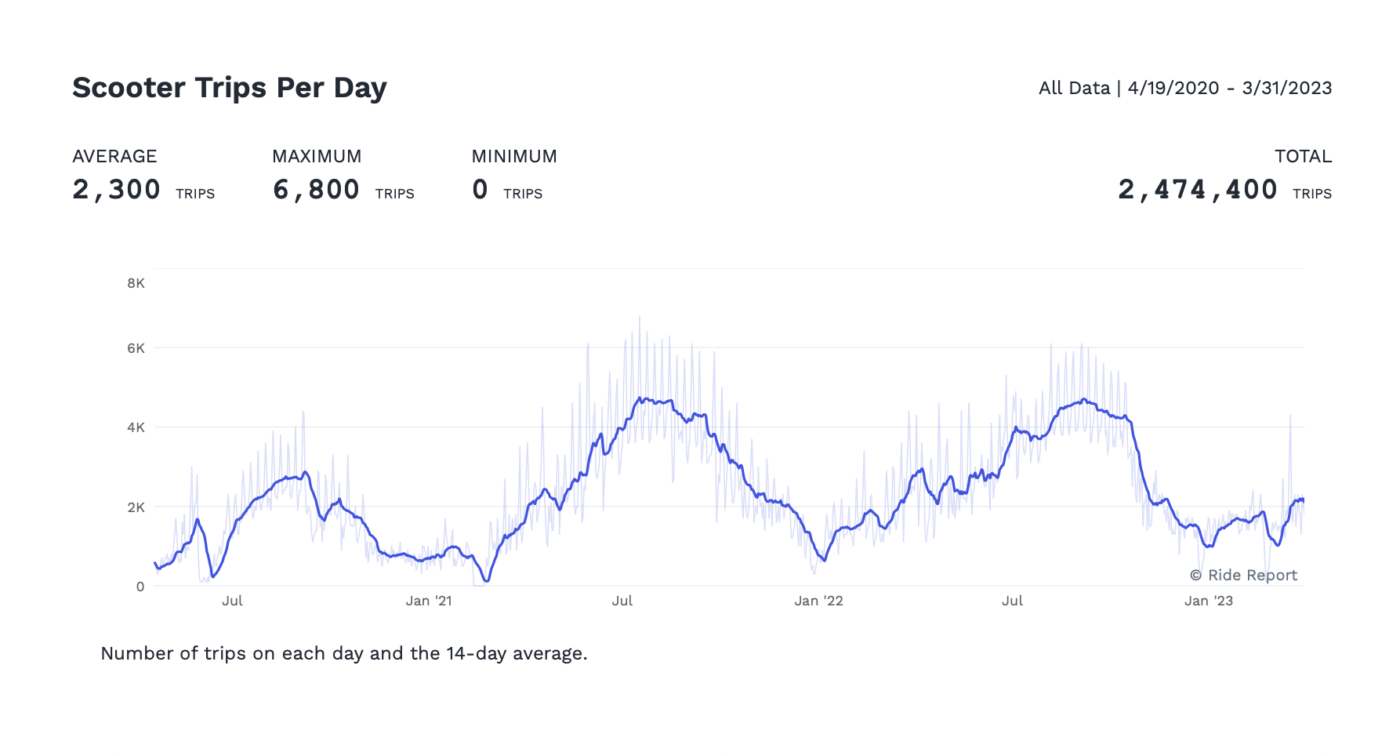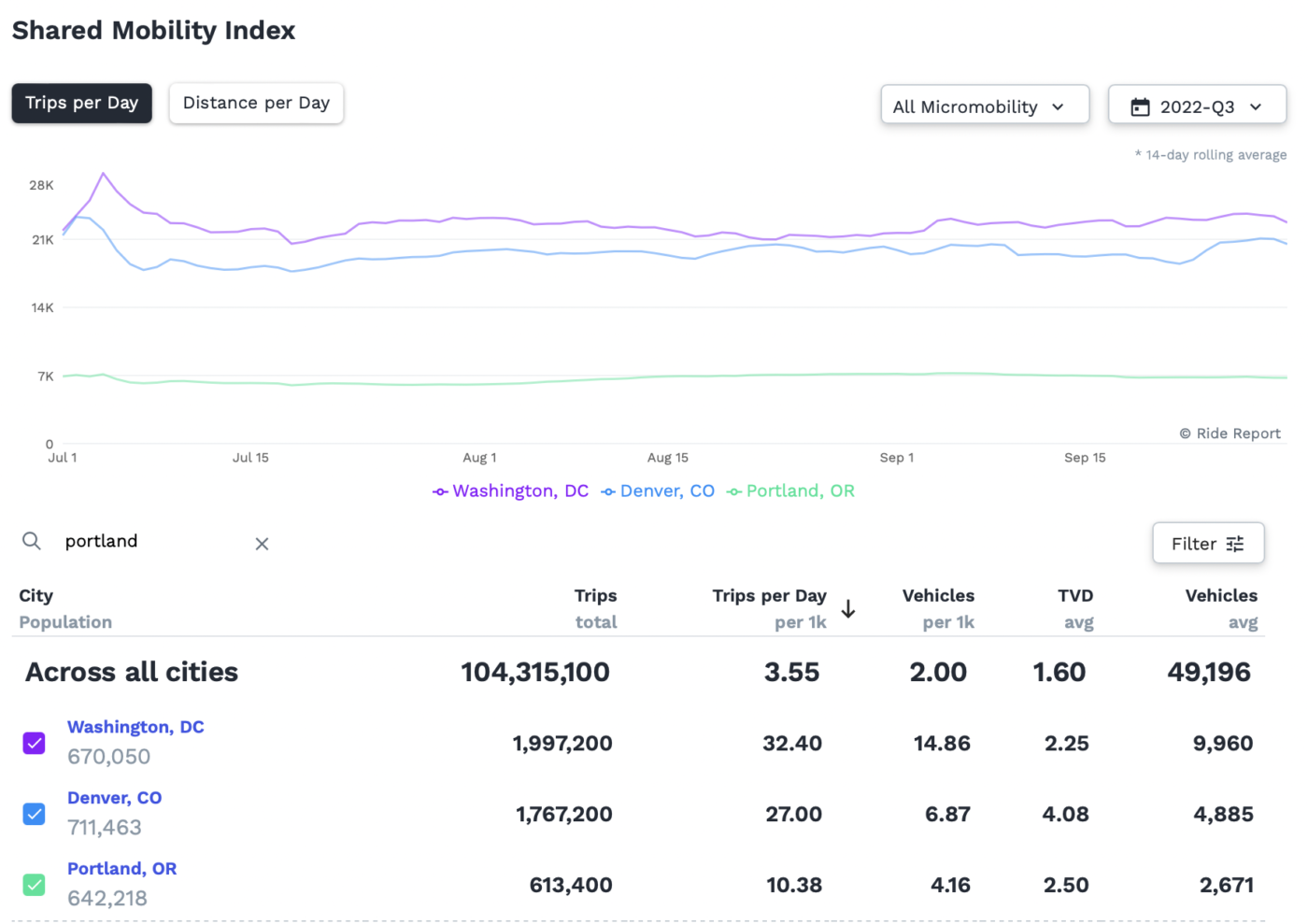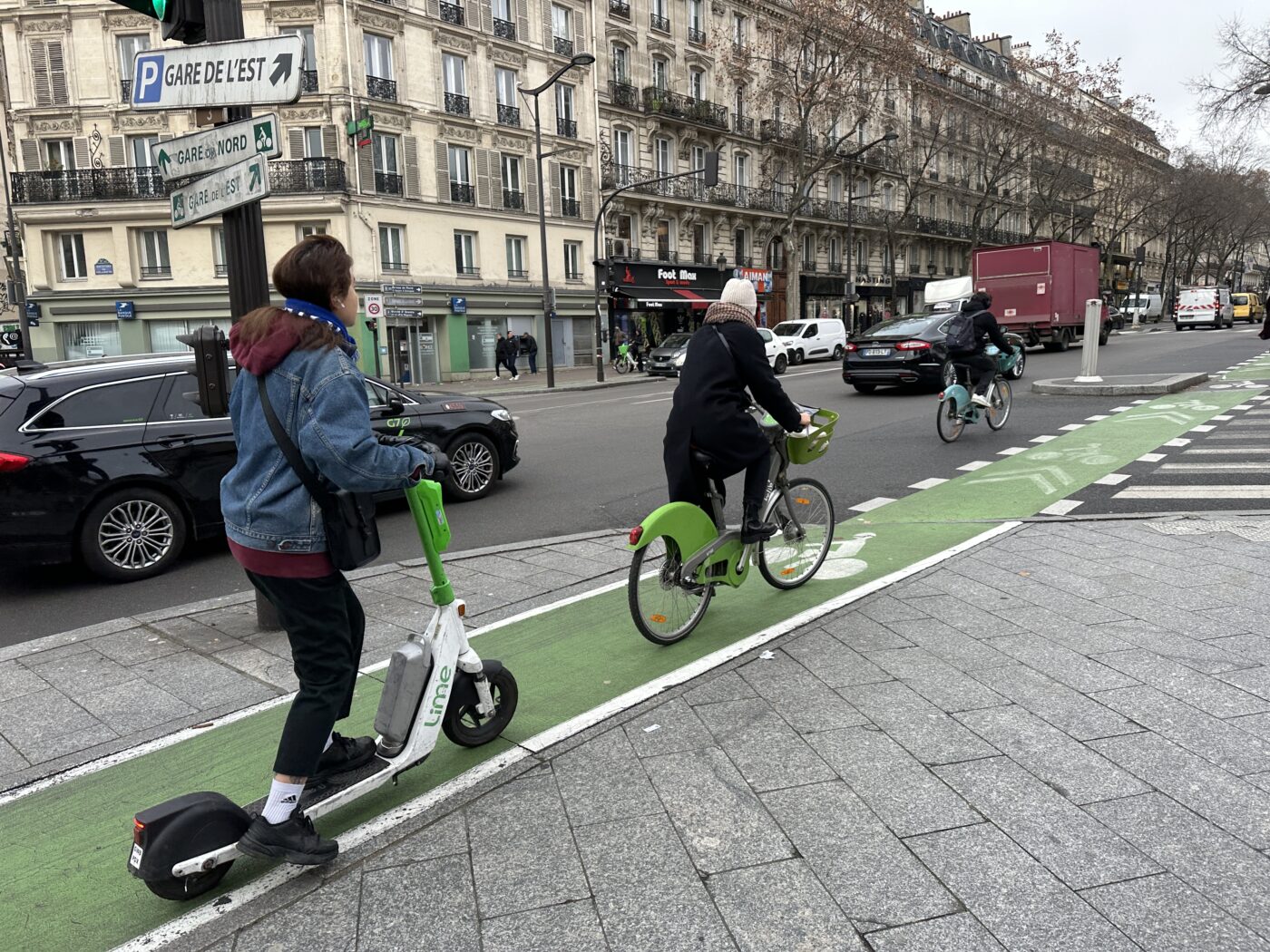 Scooters in the mix on Naito Parkway in 2018. (Photo: Jonathan Maus/BikePortland)
Scooters in the mix on Naito Parkway in 2018. (Photo: Jonathan Maus/BikePortland)
Electric scooter rentals first hit the streets of Portland almost five years ago, during the summer of 2018, and they’ve since become a fixture in the city. Though once feared to be an agent of disaster, it seems like the panic over e-scooters in Portland has mostly died down over the last few years as people got used to their presence.
Today, Portland’s e-scooter program is in a state of flux. Even though the three companies that operate rental programs here —Lime, Spin and Bird — have all replaced their scooter supply over the past year and a half, the Portland Bureau of Transportation still hasn’t made its decision about which scooter company (or companies) will be integrated into a permanent system.
One thing seems certain, though: scooters are here to stay, so we thought it was time to check-in and take a closer look.
According to PBOT’s Shared Micromobility Snapshot for 2022, which the agency released Tuesday afternoon, 2022 was a “historic year for Portland’s Biketown and e- Scooter programs.” Regardless of which company becomes PBOT’s permanent scooter operator, scooter ridership is higher than ever and the devices are contending more and more with bikes as a means of personal transportation.
Why ride scooters?
A BikePortland reader who messaged me on Twitter said he uses a Lime scooter for his daily commute to work in Portland. This is the first I’ve heard of someone doing this, so I had some questions. He said his scooter commute costs as much as a TriMet ticket, and he prefers it to riding a bike because of the ease of use.
“I could bike…but lugging it up the porch, through the living room and down to the basement every day just seems like a pain in the ass. Leaving it locked up seems risky. With a rental scooter, I don’t have to worry about maintenance, flat tires, or it getting stolen,” he wrote. He added that you can ride an e-scooter in the summer without getting sweaty at all.
More casual users may ride for novelty — anyone who’s tried one of these devices would probably admit that they’re quite thrilling to use. And if that’s enough to get someone to replace a car trip, I think that’s great.
One of the reason more people don’t ride e-scooters for daily transportation is because the price can be prohibitively expensive. Portland’s e-scooter companies charge $.36-$.49 cents a minute, plus an additional $1 fee to start. But now that Biketown, Portland’s bike share service, has raised its rates, it may not cost that much more to rent a scooter than a bike. Plus, Spin and Lime both have equity programs (similar to Biketown for All), allowing people living on low-incomes to access free and discounted trips. E-scooter passes are also included in PBOT’s Transportation Wallet program, allowing more people to access the service free of charge or at a reduced rate.
Ridership data
 Portland’s e-scooter data since Ride Report began tracking it in 2020. (Source: Ride Report)
Portland’s e-scooter data since Ride Report began tracking it in 2020. (Source: Ride Report)
One of the most helpful tools for understanding e-scooter use in Portland is the database of information created by shared micromobility management platform Ride Report in partnership with the Portland Bureau of Transportation. Let’s take a look at what the data shows.
During the last two summers, we’ve seen peak levels of e-scooter usage in Portland: from July 1 to September 30 in both 2021 and 2022, the daily average number of e-scooter trips was around 4,300. (In 2020, the daily average number of trips during that time period was just 2,300.) That’s significantly lower than the number of Biketown trips during those months. From July 1 to September 30 2021, Portland saw an average of 1,500 Biketown trips per day, and that number rose to 2,400 during the same period in 2022.
 Portland e-scooter ridership during the third quarter of 2022 (green) compared to Washington, D.C. and Denver. (Source: Ride Report)
Portland e-scooter ridership during the third quarter of 2022 (green) compared to Washington, D.C. and Denver. (Source: Ride Report)
Still, compared to e-scooter usage in some similar-sized cities, Portland is falling short. Last summer, Denver saw a total of more than 1.5 million e-scooter rides, and there were about 1.7 million rides in Washington, D.C. There were only 391,600 rides in Portland during this time.
According to Nelle Pierson from Ride Report, this can partially be attributed to a lack of scooters in Portland compared to other cities. In Washington, D.C. there are about 13 vehicles per 1000 people, whereas Portland has about three scooters per 1000 people.
“To me, this says that when the city adds more scooters, we’ll see a lot more trips!” Pierson wrote in a message to BikePortland.
But e-scooter use in Portland is higher now than it has ever been, and that rise in ridership has been consistent with the decline in bike ridership in the city. Since scooter riders aren’t counted in PBOT bike counts, this could be one of the many reasons city bike ridership may have gone down over the last few years, and could call for a change in how the bike counts are done.
So: the people have spoken, and they like electric scooters. These programs are cropping up in smaller cities as well: Eugene just launched its first e-scooter program after more than three years of planning it, so clearly city transportation planners and scooter operators are still seeing these devices as a viable means of transportation (and profit) in lots of different urban environments.
Portland scoots ahead as other cities hit the brakes
 Someone riding a Lime scooter in Paris. (Photo: Taylor Griggs/BikePortland)
Someone riding a Lime scooter in Paris. (Photo: Taylor Griggs/BikePortland)
The local scooter boom comes at a time when e-scooter rentals are in a precarious place in some cities around the world. Earlier this month, Parisians voted to ban e-scooters from the city’s streets. This was an effort supported by Paris mayor Anne Hidalgo, who has been lauded worldwide for her commitment to building out Paris’ bikeway system. But since the vote was held on a Sunday and had to be done in-person, less than 7.5% of eligible Parisian voters cast a ballot — so some people in Paris don’t feel like the decision was representative of what the population wants.
My friend Etienne, who lives in Paris, told me that there was “almost no communication” about the vote and his friends who used e-scooters are upset about it. He said the city could’ve done more to regulate e-scooters instead of banning them altogether.
“There are no real rules about circulation…they hit pedestrians sometimes because they usually ride on the sidewalk, but actually rules could’ve been made,” Etienne said.
A New York Times article about the Paris scooter ban posits that this could have an impact on other cities around the world who turn to the French capital for transportation inspiration. But barring an unforeseen plot twist, it seems unlikely that Portland will follow Paris’ lead on this issue.
The future of scooters in Portland
 New Spin scooters just dropped last week. The company is permitted to have as many as 1,083 scooters in operation. (Photo: Jonathan Maus/BikePortland)
New Spin scooters just dropped last week. The company is permitted to have as many as 1,083 scooters in operation. (Photo: Jonathan Maus/BikePortland)
Though it’s still unclear which company PBOT will choose as its permanent scooter operator (or when they will decide), the existing companies are making some changes on their own terms. Spin recently upgraded their scooter supply, with a fresh orange paint job that bears resemblance to the newly-painted Biketown bikes. According to PBOT Public Information Officer Dylan Rivera, this isn’t an indication that Spin has been chosen to operate the permanent program.
“We will remain in the pilot program until we conclude the request for proposals for the permanent program,” Rivera wrote in an email to BikePortland. “Spin has chosen to upgrade their fleet, just as both Lime and Bird have done in the last 12-18 months or so.”
When PBOT finally does choose which company will operate the permanent scooter program, it will be based on a few factors, which are laid out in the 2022 Shared Micromobility Snapshot report. Companies will need to show that they are committed to:
Reducing vehicle miles traveled (VMT) to combat climate change Promoting safety, responsible riding, and consumer protections Reducing racial disparities and advancing transportation justiceOne company that may have a leg up in terms of climate action is Lime, who has partnered with B-Line Urban Delivery to recharge scooters by electric trike as opposed to fossil fuel-burning trucks. Last summer, Lime also upgraded their fleet of scooters to include a locking feature, and riders are instructed to lock their scooter up to a bike rack if they want to avoid a $25 fee. Eventually, this will be required component throughout Portland’s entire scooter system in order to “promote safety on the sidewalks and reduce pedestrian conflicts.”
PBOT’s micromobility report also states that the city will add more e-scooters to its fleet to “further increase transportation access” and require scooter companies to have all W-2 employees to “promote equitable hiring practices and workforce development.”
With equitable pricing programs and more scooters for rent, the main thing that could prevent more ridership is a lack of adequate infrastructure. In my experience, since I’m less comfortable and experienced riding an e-scooter than a bike, I’ll only ride a scooter if I know there’s going to be proper infrastructure nearly the entire route to my destination. A new paper from the National Association of City Transportation Officials (NACTO) provides some insight to city planners for building infrastructure for micromobility devices like scooters, and if Portland is planning to get serious with scooter ridership here, it would behoove them to take note.
Overall, scooters and bikes don’t have to compete with each other: the more people getting out of their cars, the better for all vulnerable road users. It will be interesting to see how Portland’s e-scooter program evolves as PBOT chooses the city’s permanent operator. Time will tell if the ridership increases will continue — and the way the city manages the permanent program will play a role in it as well.

Taylor has been BikePortland’s staff writer since November 2021. She has also written for Street Roots and Eugene Weekly. Contact her at This email address is being protected from spambots. You need JavaScript enabled to view it.

